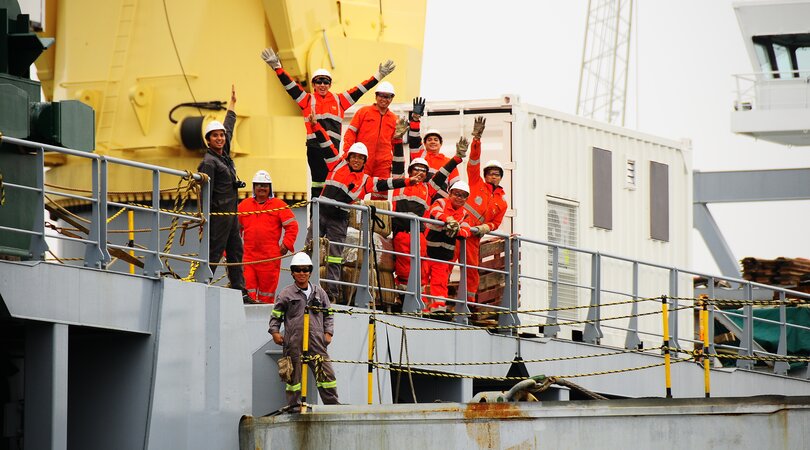Our new NorthStandard site is now live. There will be no new content or updates added to this site. For the latest information, please visit our new site north-standard.com.
文章:船员管理 - 未来的模式
标准保赔协会高级验船师 Sudhir Malhotra 在 Maritime Risk International 发表的这篇文章中介绍了航运业的变化以及与之而来的船员的变化。

作为个人职业,航运业无疑是最能改变人生的选择之一。通常在做出选择时,他们可能大多才十几岁,年轻且易受影响。他们怀揣着周游世界、建立稳固职业生涯和努力打拼获得合理酬劳的美好愿景加入了航运业这一具有挑战性、冒险性和满足感的职业。
尽管如此,当他们加入商船队时,就成为了全球货物、能源和商品的商业运输中不可或缺的一部分,成为了世界供应链中的一颗颗螺丝钉。航运业是一种经济高效的长途运输手段,因此在世界经济中占据了重要位置。
正如 国际航运公会 (International Chamber of Shipping) 所指出的,航运和世界贸易的影响及其带来的繁荣是不可低估的。每年约有 110 亿吨货物通过船舶运输。截至 2019 年,全球年度航运贸易总额已超过 14 万亿美元。每年,航运业运输近 20 亿吨原油、10 亿吨铁矿石(制造钢铁所需的原材料)和 3.5 亿吨粮食。
那么,回到做出这一重大职业选择的海员身上——他们的处境又如何呢?虽然他们现在是世界供应链不可或缺的一部分,但他们的感受可能与预期的不太一样。
在商业航运的现实世界中,存在着巨大的商业压力。所有船舶作为商业单位经营之后,商业巨头们希望尽可能精简运营、节约成本,削减所有“赘肉”。任何延误都不可接受,在港口花费的时间为(且仅为)确保船舶履行其商业合同,并为下一次装载和航行做准备。对海员来说,他们几乎不能犯错,一旦犯错后果非常残酷。如果船舶因为海员的疏忽而延误,他们很可能会失去工作。
船上海员的数量很少,也许最多只有 20 名。船员的年龄和国籍各不相同,工作背景和级别也各不相同。船员有时间真正地相互交流吗?
此外,在船上工作还有等级制度和纪律。传统的等级结构及潜在的责备文化,有时会让海员觉得最好保持沉默,随波逐流,躲进自己的壳里,尽量少问问题,免得让别人觉得他们愚蠢又不专业。
即使有上述诸多不足,但航运业绝不是一个错误的职业选择。年轻人可以学会如何承担责任,并获得其他职业无法提供的机会。他们可以去往世界各地,在不同的文化中工作,为了共同的目标与相对陌生的人建立联系。而且,他们所在船舶的平稳运行,能够为世界经济和供应链提供驱动。在登船后的几个月内,船员就会被“我可以”的态度感染,并习得一系列抢手技能,从而完成工作并适应新环境。尽管这些挑战富有吸引力而危险。船舶永不停歇,而船员就是幕后的功臣。没有他们,世界贸易将戛然而止。
不幸的是,新冠病毒危机重创了海员们的士气。海员上下船的不确定性,反复的新冠疫情,尽管接种了疫苗但检疫要求不断变化,海员待遇不佳,许多港口相关部门和国家拒绝允许船员在其领土换班,这些都加剧了这些不可或缺的“关键工作者”的痛苦。
未来的模式
我们已经谈到了海员们现在面临的许多问题。
在六七十年代,航海与今天大不相同。那时的船要小得多,船上的船员也更多。航程通常更远,因此船员们可以在休息时间相互交流、建立联系、进行社交,增进同事情谊。
如今,船员几乎没有时间进行互动,彼此之间越来越孤立疏远。
2019 年新冠病毒爆发前, 耶鲁大学 (Yale University) 对 1572 名海员进行了一项调查,研究发现各国海员存在潜在的抑郁、焦虑和自杀的风险。在调查后的两周内,初步结果显示 25% 的受访者患有抑郁症,17% 的人经历过焦虑,20% 的人有过自杀或自残的想法。
由标准保赔协会资助的《 海员幸福指数 报告》(Seafarer Happiness Index Report) 2021 年第二季度的结果与其惊人相似。船员的幸福水平从第一季度的 6.46 分急剧下降到 5.99 分(满分 10 分),令人担忧。
这些数据确实令人担忧。耶鲁大学的研究是在 2019 年新冠疫情前进行的,而新冠疫情无疑会使船员面临的问题加剧,所以现在的情况只会糟糕得多。
因此,船员经理须认识到这种日益增长的风险,并充分重视海员的福祉。为应对新冠疫情导致的前所未有的船员换班危机,标准保赔协会与航运界于 2020 年 12 月签署了 《关于海员福祉和船员换班的海王星宣言》 (Neptune Declaration on Seafarer Wellbeing and Crew Change)。为切实改善海员福祉和船员换班现状,《海王星宣言》建议采取以下行动:
- 将海员视为关键工作者,并为其优先接种新冠疫苗。
- 根据现有的最佳实践,建立和实施黄金标准的健康方案。
- 加强船舶经营人与租船人之间的合作,协助船员换班。
- 为海员确保关键海上枢纽之间的空中连接。
湿散货和干散货部门的 租船人们 提出了一套最佳实践的纲要,用于将《海王星宣言》的建议转变为实际行动。
2020 年,国际海事组织 (International Maritime Organization) 要求各国政府指定海员为 关键工作者,允许他们协商旅行限制,并为其优先接种疫苗。
尽管出现了新冠疫情,但在这个消费电子产品价格低廉的时代,船员上船时往往会携带个人电子设备(如平板电脑、笔记本电脑、智能手机和游戏设备)。海员通过这些设备可以进行娱乐活动,还可以与其家人联系。这间接导致他们在自己房间里的时间更长,从而与其他船员疏远。虽然这种行为在这个时代很普遍,但海员应抵制使自己更加孤独的诱惑,并应尽可能与同伴建立联系。人类是群居动物,而不是独立的孤岛 – 相互联系无疑有助于缓解焦虑、抑郁和消极情绪,并有助于建立信任、联系和同事情谊,这些都是当今海员们迫切需要的。
船员经理需要考虑如何解决船员孤独的问题。或许可以把重点放在公共区域和娱乐区域的改造上,让其更有吸引力,比如可以接入互联网,引入体育器材和电子游戏,这将有助于把船员们聚集在一起。虽然在一些船舶上上网是一种特权,但或许在公共区域提供更好的(但有控制的)互联网访问可能是一种有效缓解船员孤独的方法。
确保船上的文化包容性环境是船员经理提高船上福祉标准的另一个重点领域。在航运业中,船舶上的船员往往文化背景不同,这很容易导致他们之间产生潜在误解或沟通不良等问题。世界海事大学 (World Maritime University) 的一项研究显示,船舶上的文化复杂性已成为一个广受关注的问题。因为越来越多的海事事故是由于多语言和多文化船舶上对不同行为的无效沟通和误解引起的。船员经理可以从打造文化意识环境,培养全球思维,提高语言技能,推广文化差异的鉴赏等方面帮助船员接纳文化多样性和包容性。
此外,应鼓励海员畅所欲言,并应赋予他们与上级谈话时表达意见的权力。这将使每一次海上探险更加安全,因为这样的讨论有助于船员之间更好地沟通,敞开心扉。
最后,我想对所有海员们说,你们并不孤单。不管你感觉如何,千万不要做傻事。如果你需要与人交谈,许多 支持组织 都开通了全天候国际热线,你可以随时联系他们。就在你阅读这篇文章的时候,国际组织和政府也正在尽其所能确保你能正常工作,并安全地回到所爱的人身边。

A 2019, a pre Covid-19, study by Yale University on 1,572 seafarers had identified potentially dangerous levels of depression, anxiety and suicide risk amongst the world’s seafarers. Within two weeks of completing the survey, preliminary results indicated that 25% of respondents had suffered depression, 17% had experienced anxiety, and 20% had contemplated suicide or self-harm.
The Seafarer Happiness Index report, sponsored by Standard Club, reveals startlingly similar results in the Q2 2021 report results which saw happiness levels dip from 6.46 in Q1 to 5.99/10, a steep and concerning drop.
These are worrying statistics indeed and considering the Yale study was commissioned in 2019, pre-pandemic, it would only suggest that the situation is far worse today as the Covid pandemic has certainly exacerbated the issue.
It therefore becomes incumbent on crewing managers to recognise this growing risk and to put the right emphasis on seafarer wellbeing. In response to the unprecedented crew change crisis created by the Covid-19 pandemic, the Neptune Declaration on Seafarer Wellbeing and Crew Change was signed by Standard Club alongside the shipping fraternity in December 2020. To make tangible improvements to seafarer wellbeing and crew change the Neptune Declaration suggests the following actions:
- Recognize seafarers as key workers and give them priority access to Covid-19 vaccines.
- Establish and implement gold standard health protocols based on existing best practice.
- Increase collaboration between ship operators and charterers to facilitate crew changes.
- Ensure air connectivity between key maritime hubs for seafarers.
A group of charterers from both the wet and dry bulk sectors have outlined a set of best practices they have used to turn the Neptune Declaration recommendations into action.
In 2020, the International Maritime Organization had to ask governments to designate seafarers as key workers, to allow them to negotiate travel restrictions and put them in line for priority vaccinations.
Notwithstanding Covid, in this age of cheap consumer electronics, crew tend to bring in their own personal electronic gadgets (such as tablets, laptops, smart phones, and gaming devices) onboard when they join the ship. These gadgets which are used for entertainment and connecting the seafarers with their family members, inadvertently leads to them spending more time within their rooms and away from the rest of the crew. While such behaviour is a reflection of our time, seafarers should resist the temptation to isolate themselves further and should aim to connect with their peers whenever possible. Human beings are social animals and not isolated islands – connecting with one another would surely help ease some of the anxiety, depression, and negativity and would help build the trust, bond, and camaraderie that seafarers desperately need today.
Crewing managers need to consider how the issue of crew isolation can be tackled. Perhaps a focus on making the common and recreation areas a more desirable place, with some internet access, and physical and electronic games, which would help bring the crew together. Whilst internet access on some ships may seem a privilege, it could be useful to consider better (yet controlled) internet access in common areas as a solution to tackle crew isolation.
Ensuring a culturally inclusive environment on board is another area for crewing managers to focus on in order to improve wellbeing standards on board. The phenomenon of manning a ship with a culturally mixed crew is not new in the shipping industry but it can easily lead to potential misunderstandings or miscommunication issues amongst them. According to a study by World Maritime University, cultural complexity on ships has become an issue of attention, since a growing number of maritime accidents are attributed to ineffective communication and misinterpretation of different behaviours on multilingual and multicultural vessels. Boosting a culturally aware environment, developing a global mindset, improving language skills, and promoting an appreciation of cultural differences are some of the ideas that crewing managers could consider in helping educate their crew about cultural diversity and inclusion.
Moreover, seafarers should be encouraged to speak up and should be empowered to express their opinions when they are with their superiors. This would make every marine adventure safer, as such discussion would contribute towards better communication and a shared mental model amongst the crew.
Finally, it is my message to all seafarers out there that you are not alone. Regardless of how you are feeling, never do anything foolish. Should you need anyone to talk to there are numerous support organisations operating 24/7 international hotlines you can reach out to. As you are reading this, international organisations and governments are doing all that they can to ensure you can work and return home safely to your loved ones.
类别: Loss Prevention

